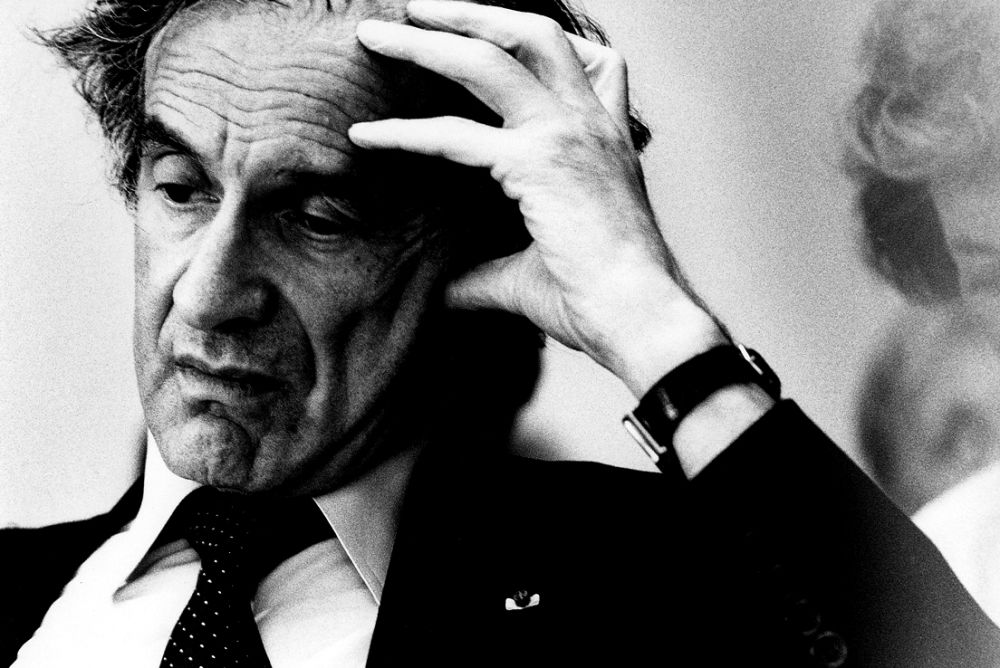Issue 91, Spring 1984

Elie Wiesel grants few interviews. This conversation took place in 1978, during two sessions at his apartment a few months before his fiftieth birthday. Through the open windows of his book-filled study, breezes carried the sounds of Manhattan spring afternoons. It was a rare privilege to converse with him. His dark, deep-set eyes were like the eyes of one of his characters in which “joy and despair wage a silent, implacable, eternal battle.”
INTERVIEWER
I would like to begin by asking about the subject matter of your books. You have written about the Holocaust, about the Bible, about Hasidism. Why haven’t you written about your years here in New York?
ELIE WIESEL
I have lived here for some twenty years, more than anywhere in the world, and yet I have devoted only a few pages to New York in The Accident and one chapter in The Gates of the Forest. Why? Because I have not yet exhausted my childhood. Words grow, age, die, and I am still interested in that metamorphosis. And the words that I use are still those that relate to my childhood.
INTERVIEWER
Yet in Messengers of God and Souls on Fire you have departed from the earlier themes of childhood.
WIESEL
I have, but, again, not entirely. In Souls on Fire, my childhood is present through my grandfather, the Hasid, and the stories I tell. The tone may be different, the treatment may be different because now it’s no longer a child speaking. In Messengers of God, again, it’s the Bible. When did I learn the Bible? When I was four or five years old. It’s still the pull of my childhood, a fascination with the vanished world, and I can find everything except that world.
INTERVIEWER
What is it you are trying to find?
WIESEL
Many things. First, what we all find in childhood: innocence, trust. Children are trusting. And in my case, order. There was a certain order in creation. I once believed that children are young and old men are old. Now I know that some children are very old. Also, I know that the secret to all the other enigmas is rooted in that childhood. If ever I find an answer to my questions, it will be there, in that period, in that place.
INTERVIEWER
Any particular aspect of your childhood?
WIESEL
Sighet, my little town, all the characters that I am inventing or reinventing, all the tunes that I have heard. It is always, whatever its name, that little town Sighet. The very existence of that town in the midst of so much hostility was a miracle then and is a miracle now.
INTERVIEWER
For ten years you waited until you were ready to write about the Holocaust in your first book, Night.
WIESEL
I didn’t want to use the wrong words. I was afraid that words might betray it. I waited. I’m still not sure that it was the wrong move, or the right move, that is, whether to choose language or silence.
INTERVIEWER
Why do you say that?
WIESEL
Maybe if we had kept quiet then—this is what I try to say in The Oath—maybe we wouldn’t have this fashionable phenomenon. The Holocaust would not have become a fashionable subject which I find as offensive, if not more so, than what we had before: ignorance of the subject.
INTERVIEWER
But then you no longer would have been a messenger.
WIESEL
Sometimes you don’t have to speak in order to be heard, not when the message is so powerful. It used to be said that when the Baal Shem Tov came into a town his impact was so strong, he didn’t have to speak. His disciples had to dance or to sing or to preach to have the same effect. I think a real messenger, myself or anyone, by the very fact that he is there as a person, as a symbol, could have the same impact.
INTERVIEWER
But often by remaining silent we lose communication.
WIESEL
That’s a danger. That’s why I did not keep silent. If I had thought that by my silence, or rather by our silence, we could have achieved something, I think I would have kept silent. I didn’t want to write those books. I wrote them against myself. But I realize that if we do not use words, the whole period will be forgotten. Therefore, we had to use them, faute de mieux.
INTERVIEWER
What do you mean you didn’t want to write those books?
WIESEL
I didn’t want to write a book on the Holocaust. To write such a book, to be responsible for such experiences, for such words—I didn’t want that. I wanted to write a commentary on the Bible, to write about the Talmud, about celebration, about the great eternal subjects: love and happiness.
INTERVIEWER
But you had no choice?
WIESEL
Exactly. I had to. It wasn’t voluntary. None of us wanted to write. Therefore when you read a book on the Holocaust, written by a survivor, you always feel this ambivalence. On one hand, he feels he must. On the other hand, he feels . . . if only I didn’t have to.
INTERVIEWER
What happens when this conflict occurs inside of you? Does it change the nature of the work?
WIESEL
No, because the work itself then reflects the conflict. I incorporate it. Take The Oath, a novel set at the beginning of the century, about a village and ritual murder, nothing about the Holocaust. But then on another level, it is the Holocaust—not of the Jews but of the world. That’s why I called the village Kolvillàg. Villàg in Hungarian means world, and kol in Hebrew means all—the entire world.



